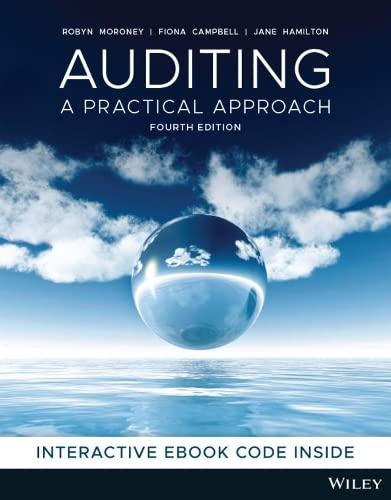Question
Managers at Fluid Induction Industries are reviewing the economic feasibility of manufacturing a part that the company currently purchases from a supplier. Forecasted demand for
Managers at Fluid Induction Industries are reviewing the economic feasibility of manufacturing a part that the company currently purchases from a supplier. Forecasted demand for this part is 16,800 units. Fluid operates 250 days per year.
Fluids financial analysts established the cost of 9% for the use of funds for investments within the company. Also, over the past year $2,200,000 was the average investment in the companys inventory. Accounting information shows that a total of $101,000 was spent on taxes and insurance related to the companys inventory. Additionally, an estimated $29,000 was lost to inventory shrinkage, this included broken and damaged goods, and pilferage. $100,000 was spent on warehouse overhead, including expenses for heating and lighting.
Two hours are required to process and coordinate an order for the part regardless of the quantity ordered. Purchasing salaries average $28 per hour, including benefits. A detailed accounting analysis on 1,250 orders revealed that $25,000 was expensed for internet, paper and postage directly related to this ordering process.
Lead time for this part is one-week. The use of the part during the lead time is normally distributed with a mean of 960 units and a standard deviation of 16 units. The companys policy regarding stock-outs is that one stock-out per year is permitted.
The company has a current contract to purchase the part from the supplier for $90 per unit. Fluid has increased its manufacturing capacity and is considering producing the part in house. The utilization of the increased capacity will produce at a rate of 4,800 units per month with up to 5 months of production time available. Management believes that with a two-week lead-time it can schedule the production of the part when needed. . The use of the part during the lead time is normally distributed with a mean of 1,280 units and a standard deviation of 200 units. Production costs are estimated at $76.50 per unit.
A major concern for the company is the fact that it will take two full 8 hour shift to set up the equipment. The total cost of labor is estimated to be $150 per hour.
Managerial Report.
Develop a managerial report that will address the question as to whether the company should purchase or manufacture the part itself. Include the following factors in your report:
1.An analysis of the holding cost.
2.An analysis of the ordering cost.
3.An analysis of setup cost.
4.Develop an inventory for ordering a quantity form the supplier and producing a quantity in house.
Include such information as Q, number of orders/production runs, cycle time, ROP, amount of safety stock, expected maximum inventory, annual cost of the units purchase or manufactured.
Make a recommendation to management whether the company should purchase or manufacture the part and the cost savings associated with your recommendation.
Step by Step Solution
There are 3 Steps involved in it
Step: 1

Get Instant Access to Expert-Tailored Solutions
See step-by-step solutions with expert insights and AI powered tools for academic success
Step: 2

Step: 3

Ace Your Homework with AI
Get the answers you need in no time with our AI-driven, step-by-step assistance
Get Started


